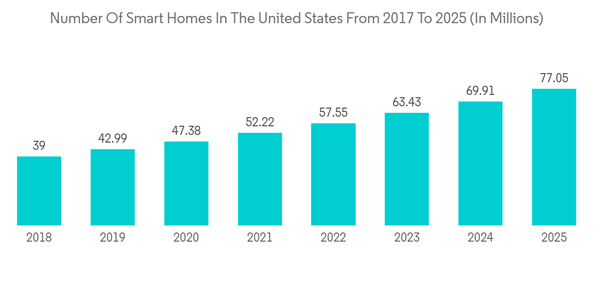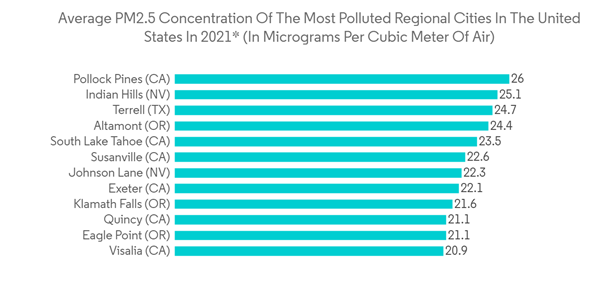A contemporary take on the conventional air purifier, the smart air purifier automatically filters the air for a variety of users. It can be controlled remotely by using an app on smartphones connected to smart air purifiers via wireless networks like Wi-Fi and Bluetooth. The smart air purifier's key benefit is that users can use their smartphones to control basic settings, check indoor air quality, and monitor outdoor air quality. Additionally, these devices use specialized monitoring sensors to gather data on air quality, automatically clean the air in accordance with that information, and notify users when air quality levels change.
By adjusting the air-cleaning settings on these purifiers, users may control them using smartphone apps. Most smart air purifiers are placed and utilized indoors, in places like homes, small companies, industrial structures, and vehicles. Smart air purifiers are equipped with technology that takes out dust, pollutants, and smoke from the air automatically. These devices are available in scent-releasing versions that can improve the atmosphere and aroma of the space.
Rising pollution levels and the prevalence of airborne diseases in the country have increased product demand. Several states, including California, Chicago, Illinois, Ohio, Oklahoma, and Mississippi, implemented lockdown measures to control the spread of COVID-19. As a result, sales of home appliances such as air purifiers, cleaning appliances, kitchen appliances, and water filtration devices have increased. Rising health-consciousness has also contributed to increased product sales in the country.
US Smart Air Purifier Market Trends
Smart Air Purifiers Being Integrated into Smart Home Ecosystems
The air around is automatically cleaned by smart air purifiers, which are stylish, portable, and simple to use. With these purifiers, the user can use a smartphone to regulate fan speed and runtime, as well as monitor temperature, air quality, and other particulate contaminants. These cutting-edge air purifiers work with other smart home appliances like Google Assistant, Amazon Alexa, and others.The ability to automatically monitor, respond to and purify the interior air is provided by a built-in air quality meter with electrostatic charging technology. Electronic touch controls on smart air purifiers make it simple to change the fan speed and enable Wi-Fi connectivity.
With a real HEPA filter that can effectively catch 99.7% of undesirable airborne particles such as dust, lint, allergies, germs, viruses, spores, and pet danger using electrostatic technology, smart air purifiers also provide strong filtering technology. Also, smart purifiers have a filter life tracker in a variety of sizes and forms so that customers can select one that suits their needs.
The growing demand for these intelligent air purifiers across the United States will certainly fuel market expansion in the years to come.
Increasing Air Pollution and Deteriorating Air Quality to Drive Demand for Air Purifiers
As a result of the loss of forest cover, rising levels of pollution are being caused by increased globalization, infrastructure development, and huge construction projects being carried out to build airports, homes, transportation systems, and other facilities. The demand to build air purifying equipment is being driven by particulate matter emissions caused by a high reliance on air conditioners.For instance, air pollution, which is frequently produced by burning fuel for transportation, power generation, and home and business heating, is to blame for the majority of premature deaths in the United States. Hence, it is projected that in the United States, demand for air purifying systems in residential, commercial, and industrial settings would increase as worries about growing pollution levels grow.
US Smart Air Purifier Industry Overview
US smart air purifier market is fragmented due to the presence of a large number of global and regional players in the market like IQAir North America, Inc., Honeywell International, Inc., Sharp Corporation, Dyson Limited, Honeywell International, Inc., LG Electronics, Unilever PLC, Aerus LLC, Panasonic Corp., Hamilton Beach Brands, Inc., Whirlpool Corp., and Daikin Industries, Ltd, among others. Manufacturers are introducing new products in the market using new technologies. The companies use various marketing strategies to increase their market shares. Some of the market's leading players are heavily investing in research and development activities to improve their position in current electronic technologies and processes in order to increase efficiency and lower costs.Additional Benefits:
- The market estimate (ME) sheet in Excel format
- 3 months of analyst support
This product will be delivered within 2 business days.
Table of Contents
Companies Mentioned (Partial List)
A selection of companies mentioned in this report includes, but is not limited to:
- Sharp Corporation
- Dyson Limited
- Xiaomi Corporation
- Honeywell International, Inc.
- Hamilton Beach Brands, Inc
- Koninklijke Philips NV
- LG Electronics, Inc.(LG Corp)
- IQAir North America, Inc
- Havells India Ltd.
- Daikin Industries, Ltd
- Coway Co., Ltd.
- Levoit (Vesync Co., Ltd.)
- Unilever PLC (Blueair AB)
- Smart Air Filters Pvt Ltd.
- Whirlpool Corporation
- Winix Inc.*










